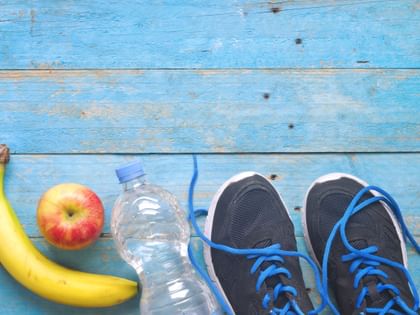The right nutrition for better running performance
Unleash your potential to the fullest
As is the case in running training, the right mix in nutrition determines success: We’ll show you the optimum nutrition before and after training and how to achieve maximum performance with the right combination of carbohydrates, protein and fat.
Whether you’re new to running or a professional: Every runner discovers the connection between performance in running and nutrition. If you provide your body with the optimum food at the right time, you can enhance your performance noticeably.
Generally, the following applies: Your nutrition should consist of 55 – 60 percent carbohydrate, 25 –30 percent fat and 10 –15 percent protein. You can modify this rule according to the goal of your running training: Do you want to run a marathon next week or are you going jogging to lose weight? Individual adaptation of the nutrition components is therefore absolutely expedient.
Food before running
Ensure that you do not eat your last meal later than two hours before your training session. Otherwise, the food lies heavy in your stomach and your metabolism is occupied with digestion, instead of supporting your running performance. If you feel hungry immediately before running or if you want to push your body with the targeted supply of energy, it is best to choose a ripe banana, quark or a protein drink.
If you are planning to participate in a competition, a (half) marathon or a triathlon, you should already be working with a consciously designed nutrition plan several days, or at least one week before the date. Depending on your constitution and condition, the optimum supply for you may contain more or less carbohydrates or protein. Your gut feeling is important here (you have to feel good and full of energy while running) and there view of the training results (distance and time).

Nutrition after training & competitions
After you have finished the run, your metabolism continues to work at high speed! The so-called after burn effect lasts two to three hours. This is the most suitable time to refill your empty carbohydrate stores.
With whole meal pasta, rice and potatoes, wholesome bread and organic fruit, you can satisfy your hunger and actively support your body’s recovery process. After approx. three hours is the best time for the intake of protein. Quark with fruit, protein shakes, skyr or yoghurt not only taste refreshing but also provide a lot of building blocks for your muscles.
Don’t forget: Fats play an essential role for the metabolism and cells! Make sure that you use high-quality, cold-pressed oils, and food with a high proportion of omega-3 fatty acids. Cross off products containing palm oil and food containing saturated fats from your shopping list.

Lose weight through running
Intentional and targeted weight loss can strengthen your running performance. Your muscles do not have to move as much weight, and the load on your joints is reduced. Your performance is retained with lower-carbohydrate nutrition. Your body gets used to the decreased intake of carbohydrates and improves its lipometabolism, and you avoid hunger pangs.
You then lose weight more or less automatically if you continue to train according to your plan. A tip: Three to five days before a competition, you consciously fill up your reserves with carbohydrates for this sort of nutrition –which gives you real power when running!

Minerals and trace elements
You shouldn’t wait to be brought to your knees by the first cramps in your calves when you are running. Before you need to ensure you have a sufficient supply of these important substances. A balanced diet contains all these substances, but it may be necessary to take nutritional supplements if you participate in intensive sport.
You should consume these minerals and trace elements regularly:
- Magnesium: indispensable for energy metabolism and bone metabolism as well as hormone balance. Also available as a dietary supplement in tablet or shot form.
- Potassium: essential for electrolyte and fluid balance, for the utilisation of carbohydrates and to maintain the performance capacity of the muscles and nerves.
- Iron: necessary for the production of redblood cells, which are responsible for oxygen transport and energy metabolism in the body, among others.
- Zinc: crucial for the regeneration and renewal of somatic cells, important for the immune and hormonal system. A tip: Apply zinc ointment to small wounds.
- Phosphorus: required to regulate the pH value in the body.
- Calcium: an important component for the development of bones and teeth, a motor for muscle activity, and vital for blood clotting and the nervous system.

Hydration for runners, and alcohol
It is essential to drink enough if you want to be successful in running! The human body consists of 50 –60 percent water, depending on your age. While running, you lose fluids and minerals incredibly quickly through sweating and evaporation. A rule of thumb: Before training, per hour of training and after training,drink at least half a liter.
Water, unsweetened and diluted fruit juices, herbal teas – find out what’s good for you and what tastes good. But what about the question of alcohol and running? A beer or a glass of wine beforehand or afterwards–can that do any harm?
The answer is clear: Yes, it can. Alcohol after running delays the body's regeneration, it can disrupt the immune system and make you more susceptible to infections. If you don’t want to go without your beer after a run, then choose an alcohol-free beer. These are even isotonic (and therefore usually better than all isotonic drinks with artificial flavourings) and contain a negligible 0.5 percent alcohol, i.e. about the same amount as apple juice.


